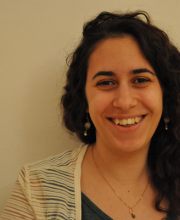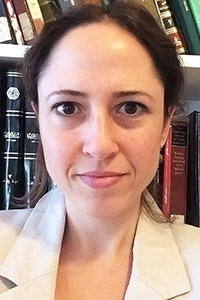Andrew Rippin Best Paper Prize Winner 2024
The International Qurʾanic Studies Association is delighted to announce that the seventh annual Andrew Rippin Best Paper Prize (open to papers delivered by early career scholars at the 2023 Annual Meeting) has been awarded to Paul Neuenkirchen for his paper: “Fear/Remembrance of God, Prayer, and Constancy as Ways of Fighting Demons Between the Qurʾān and Late Antique Ascetic Writings.” The winner of the Andrew Rippin Best Paper Prize receives a cash award. In addition, an expanded and edited version of the winning paper qualifies for publication in the Journal of the International Qur’anic Studies Association.
 This award is given in honor of Professor Andrew Rippin (1950–2016), a leading scholar of the Qurʾān and inaugural president of the International Qur’anic Studies Association (2014). Prof. Rippin is remembered as “an esteemed colleague, revered mentor, and scholarly inspiration to many members of the IQSA community.” An announcement regarding submissions for the eigth annual Andrew Rippin Best Paper Prize will follow the 2024 IQSA Annual Meeting.
This award is given in honor of Professor Andrew Rippin (1950–2016), a leading scholar of the Qurʾān and inaugural president of the International Qur’anic Studies Association (2014). Prof. Rippin is remembered as “an esteemed colleague, revered mentor, and scholarly inspiration to many members of the IQSA community.” An announcement regarding submissions for the eigth annual Andrew Rippin Best Paper Prize will follow the 2024 IQSA Annual Meeting.
An abstract of the award-winning paper follows:
“Fear/Remembrance of God, Prayer, and Constancy as Ways of Fighting Demons Between the Qurʾān and Late Antique Ascetic Writings”
My article explores the ways in which late antique Christian ascetic practices and beliefs can help us better understand certain verses of the Qur’an and shed a light on the beginnings of Islam. I begin by focusing on key aspects of asceticism that pervade both the vast corpus of late antique Christian texts and the Qur’an. These are the fear and remembrance of God, prayer, and constancy. I examine the ways in which many Qur’anic verses engage with this fundamental set of practices and beliefs, how they reshape them, and what these processes might tell us about the early community of Muhammad’s Believers and the history of the Qur’an. After showing that these ascetic concepts are consistently invoked as different ways of fighting demons in late antique Christian literature, I argue that while the Qur’an never explicitly instructs its audience on how to ward off demons, in many instances it alludes to a set of tools that it shares with Christian ascetics. In carrying out this study, I primarily analyze late antique Christian texts ranging from the Greek Apophtegmata Patrum to Syriac writings by authors such as Jacob of Serugh, Isaac of Nineveh or Dadisho Qatraya, which I compare with individual Qur’anic verses. Finally, I examine the shortest surah of the Qur’an, al-Kawthar, which I use as a case study to suggest that it can be understood as instructing the believer to exercise constancy and to pray as a means of defeating Satan.
 Paul Neuenkirchen is a postdoctoral fellow in the “Interactive Histories, Co-Produced Communities: Judaism, Christianity, Islam” joint research project between the University of Bern (Switzerland) and the Institute of Advanced Study, Princeton. He specializes in the history of the Qur’anic text and the beginnings of Islam. His Ph.D., which he defended in 2019 at the Ecole Pratique des Hautes Etudes (Paris), examined the Qur’an’s eschatological discourse in light of Syriac homilies. At present, his work focuses on a comparative study between Late Antique asceticism and the Qur’an. His most recent publications are “Late Antique Syriac Homilies and the Qurʾān. A Comparison of Content and Context”, MIDEO 37 (2022), pp. 3-28 and “Eschatology, Responsories and Rubrics in Eastern Christian Liturgies and in the Qurʾān: Some Preliminary Remarks”, in Early Islam. The Sectarian Milieu of Late Antiquity? (ed. Guillaume Dye) (Brussels, 2023), pp. 131-146.
Paul Neuenkirchen is a postdoctoral fellow in the “Interactive Histories, Co-Produced Communities: Judaism, Christianity, Islam” joint research project between the University of Bern (Switzerland) and the Institute of Advanced Study, Princeton. He specializes in the history of the Qur’anic text and the beginnings of Islam. His Ph.D., which he defended in 2019 at the Ecole Pratique des Hautes Etudes (Paris), examined the Qur’an’s eschatological discourse in light of Syriac homilies. At present, his work focuses on a comparative study between Late Antique asceticism and the Qur’an. His most recent publications are “Late Antique Syriac Homilies and the Qurʾān. A Comparison of Content and Context”, MIDEO 37 (2022), pp. 3-28 and “Eschatology, Responsories and Rubrics in Eastern Christian Liturgies and in the Qurʾān: Some Preliminary Remarks”, in Early Islam. The Sectarian Milieu of Late Antiquity? (ed. Guillaume Dye) (Brussels, 2023), pp. 131-146.
© International Qur’anic Studies Association, 2024. All rights reserved.

 The International Qurʾanic Studies Association is delighted to announce that the sixth annual
The International Qurʾanic Studies Association is delighted to announce that the sixth annual  Eric DeVilliers hails from Fredericksburg, Virginia. He is a PhD candidate at the University of Notre Dame, specializing in Qur’anic studies and Islamic theology. His dissertation investigates the roots and significance of the controversy surrounding the vision of God (ru’yat Allah) from Late Antiquity to the early Islamic period. He is currently performing research in Cairo on a Fulbright student research grant that explores the topic of the vision of God in the Kalām tradition.
Eric DeVilliers hails from Fredericksburg, Virginia. He is a PhD candidate at the University of Notre Dame, specializing in Qur’anic studies and Islamic theology. His dissertation investigates the roots and significance of the controversy surrounding the vision of God (ru’yat Allah) from Late Antiquity to the early Islamic period. He is currently performing research in Cairo on a Fulbright student research grant that explores the topic of the vision of God in the Kalām tradition.



